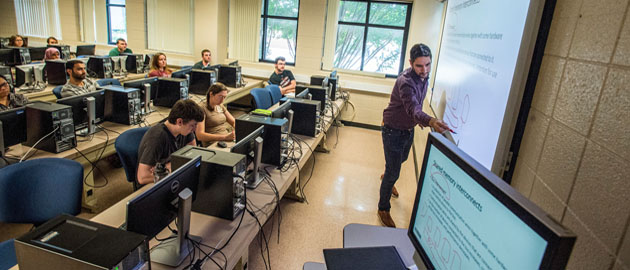
Weekly Seminars
There will be a weekly seminar in our Department on any topic relevant to Electrical, Computer and Biomedical Engineering. The seminar will be located in the ECE Conference Room, E122, every Tuesday. Please note the new time is 10AM.
May 2, 2017: Scheduling Mutual Exclusion Accesses in Multithreaded Programs
Scheduling Mutual Exclusion Accesses in Multithreaded Programs
Speaker: Dr. Dimitrios Kagaris
Place and Time: Engineering E, Room E-122; Tuesday May 2, 10:00 AM
Abstract: A fundamental problem in multithreaded parallel programs is the partial serialization that is imposed due to the presence of mutual exclusion variables or critical sections. In this talk we investigate a model that considers the threads consisting of an equal number L of functional blocks, where each functional block has the same duration and either accesses a critical section or executes non-critical code. We develop a provably optimal and fast polynomial-time algorithm to find a schedule with the shortest makespan for any number of threads and for any number of critical sections for the case of L = 2. For the general case L > 2, which is NP-complete, we present a competitive heuristic and provide experimental comparisons with the ideal integer linear programming (ILP) formulation.
April 25, 2017: Many-core Systems: Challenges and Trends Towards Heterogeneity
Many-core systems: Challenges and trends towards heterogeneity
Speaker: Dr. Iraklis Anagnostopoulos
Place and Time: Engineering E, Room E-122; Tuesday April 25, 2:00 PM
Abstract: One thing that characterizes the development of modern computing and embedded architectures, it is the always accelerating change in the number of processors that are employed on modern systems. The number of cores to be integrated in a single chip is expected to rapidly increase in the coming years. Large industrial companies endorse this vision and have started to experiment and commercialize systems with increased number of processing elements. Heterogeneous components (e.g. GPUS, hardware accelerators) are also integrated in modern platforms in order to further increase system's performance. However, this increase in the number of computing resources has not resulted in the expected performance gains. The main reason lies in the significant challenges regarding the scalability of traditional run-time resource management schemes. This seminar will present an overview of new technologies and the challenges that arise in the field of heterogeneous many-core systems.
April 18, 2017: Fractional Fourier Transform and Optics (Extended Version)
ECE Seminar (April 18th), 2:00 PM, E-122 (ECE Conference Room) :
Mohammad Sayeh: Fractional Fourier Transform and Optics (Extended Version)
Abstract: Fractional Fourier Transform (FrFT) is a generalized Fourier transform with a chirp function as its kernel. FrFT can be implemented using optical fiber or lens . Applications of this transform will be discussed which include chirp filtering and virtual lens.
April 11, 2017: Fractional Fourier Transform and Optics
ECE Seminar (April 11th), 2:00 PM, E-122 (ECE Conference Room) :
Mohammad Sayeh: Fractional Fourier Transform and Optics
Abstract: Fractional Fourier Transform (FrFT) is a generalized Fourier transform with a chirp function as its kernel. FrFT can be implemented using optical fiber or lens . Applications of this transform will be discussed which include chirp filtering and virtual lens.
April 4, 2017: Neural Networks for Speech and Language Processing
ECE Seminar (April 4th), 2:00 PM, E-122 :
Dr. Jun Qin: Neural Networks for Speech and Language Processing
Abstract: Neural network technologies have been used in various multidisciplinary research fields, including big data analysis, image processing, speech and language processing, multimodal signal analysis, etc. In this presentation represents our research on speech and acoustic signal processing. Two of our recent studies on neural network based speech and language processing will be presented, including: 1) enhanced factored three-way restricted Boltzmann machines for speech detection; and 2) neural network based EEG-Speech models. In addition, we will also briefly introduce other acoustic signal processing related research projects for clinical, military, and industrial applications.
March 27, 2017: Quantum Key Distribution: Protocols, Challenges, and Device Design
ECE Seminar (March 27th), 2:00 PM, E-122 (ECE Conference Room) :
Md Rezaul Karim Nishat: Quantum Key Distribution: Protocols, Challenges, and Device Design
Abstract: The Heisenberg uncertainty principle and quantum entanglement can be exploited in systems for secure communication, often referred to as quantum cryptography. Polarization entangled photon pair generator can be used to generate Qubits to realize the encryption mechanism. The biexciton-exciton cascade process in semiconductor quantum dots (QDs) has been proposed as a source of polarization entangled photon pairs; yet, for realistic QDs, the intermediate exciton state is split by the electron hole exchange interaction. This energetic difference between the two bright exciton states is known as the fine-structure splitting (FSS). FSS destroys the basic condition for entanglement, which requires two photons with different polarizations but indistinguishable otherwise. In this seminar, I will first present a brief synopsis on quantum key distribution and associated challenges. Then, I will describe some of our on-going efforts on developing an atomistic simulator, based on coupling of multimillion-atom tight-binding formalism and many-particle full configuration interaction (FCI) method, to design semiconductor QDs for the generation of entangled photon pairs.
